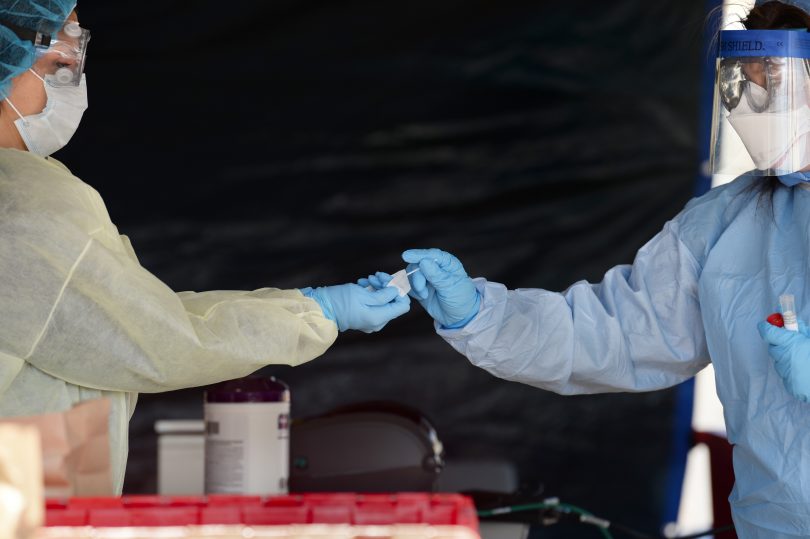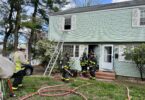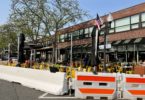Reopening Connecticut’s economy will include considering hospitalization numbers, widespread COVID-19 testing and detailed tracking of infections in different regions.
By Patrick Skahill, CT Public Radio for CTMirror.org
Ronni Newton, We-Ha.com, also contributed to this article
The road to reopening Connecticut’s economy will likely require a phased-in approach that will consider hospitalization numbers, widespread COVID-19 testing, and detailed tracking of infections in different regions, Gov. Ned Lamont said Thursday.
Having adequate protective gear and considering essential vs. less essential and high risk vs. relatively low risk business will also be considered.
On a day when Connecticut’s COVID-19 case count rose to nearly 16,000, state officials said those factors could be the key to getting the state safely back to work. The state on Thursday also reported a total of 971 deaths since the outbreak began.
West Hartford’s total number of confirmed positive COVID-19 cases increased by 12 on Thursday, to a total of 142.
There was one more fatality in West Hartford due to the coronavirus Thursday, for a total of 18.
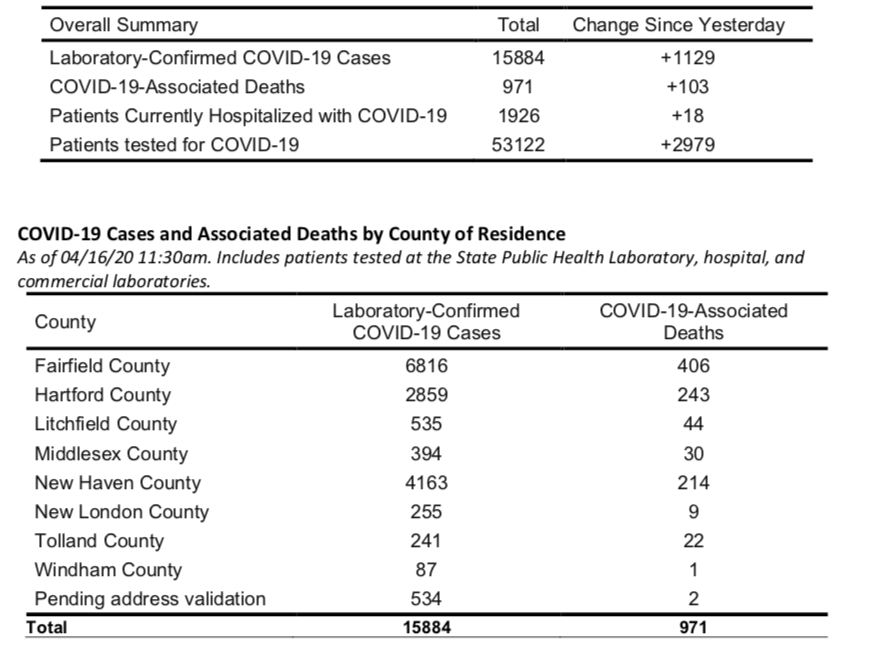
“This is a pandemic that’s going to be with us for a while,” Lamont said. “Even though we’ve got to think about what happens next.”
Lamont likened the situation to being in an airplane and building it at the same time. “What is a soft landing for that plane?” he said, to ensure that it won’t bounce back up again.
What’s next, for now, is an advisory board that will include representatives from labor, small business and the scientific communities. The co-chairs are former PepsiCo CEO Indra Nooyi and Yale University epidemiologist Albert Ko, who said the challenge they face has “no magic bullet.”
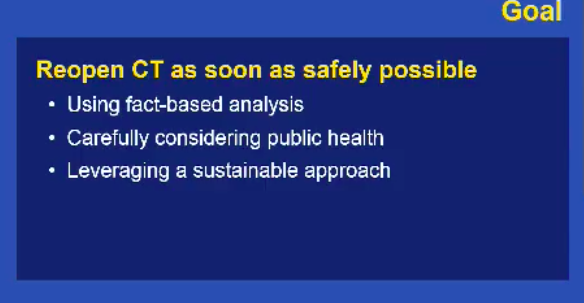
Nooyi said the plan would be developed using “fact-based analysis.”
“Vaccines are likely 18 months … if not two years away from us,” Ko said. “So we have to invest in the hard work now.”
Ko specified that metrics which used to indicate when the state is ready to ease restrictions will include a 14-day decline in cases and hospitalizations; the ability to do mass testing, contact tracing, isolating those who are exposed; protection of high-risk populations; and adequate supply of PPE; maintenance of physical distancing; and adequate capacity in the hospitals for all to receive a proper level of care.
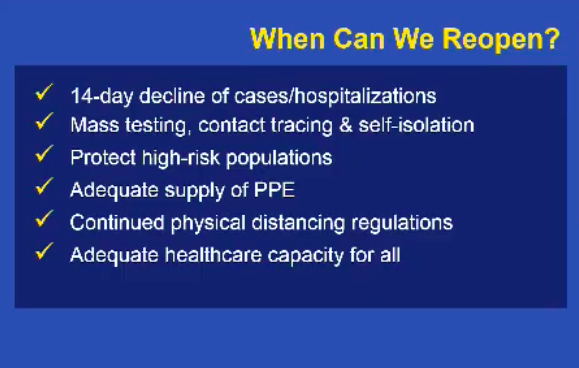
The advisors are expected to collaborate with state legislative leaders about when and how to reopen portions of the state’s economy.
“It’s a business decision, but, more importantly, it’s a public health decision,” Lamont said. “Those two are going to be made together: with a focus on the public health.”
Right now, the governor said May 20 is the next big decision point for reopening schools and parts of the Connecticut economy.
Dedicated COVID-19 Recovery Centers Begin Accepting Patients
COVID-19 patients well enough to be discharged from a hospital, but not well enough to go home, now have several places in Connecticut to recover.
Athena Health Care Systems announced Thursday it has accepted two patients at a dedicated floor of its Sharon Health Care Center. Northbridge Health Care Center, an Athena facility in Bridgeport, will also begin to receive recovering patients on Monday.
Tim Brown, a spokesperson for Athena, said two more centers – one in Torrington and one in Meriden – are also expected to open in the coming days.
“Torrington and Meriden were closed buildings that we are working to re-open,” Brown said in an email. “Torrington will be able to accept admissions next week.”
Other facilities have been set up by Hartford HealthCare and the Connecticut National Guard.
The recovery centers aim to free up hospital beds by admitting acute care COVID-19 patients who no longer require the specialized medical care of a hospital.
Hartford HealthCare employee dies
An employee at Hartford HealthCare has died after testing positive for COVID-19, hospital officials said Thursday.
“Our heart goes out to the family and friends and members of his team,” said Hartford HealthCare Chief Clinical Officer Ajay Kumar. “We’re all saddened by this.”
The hospital system did not release further details about the case. It’s unclear when the employee came down with symptoms, where he worked or when he died.
Hartford HealthCare employs around 30,000 people. Its network includes Hartford Hospital, The Hospital of Central Connecticut, and St. Vincent’s Medical Center in Fairfield County.
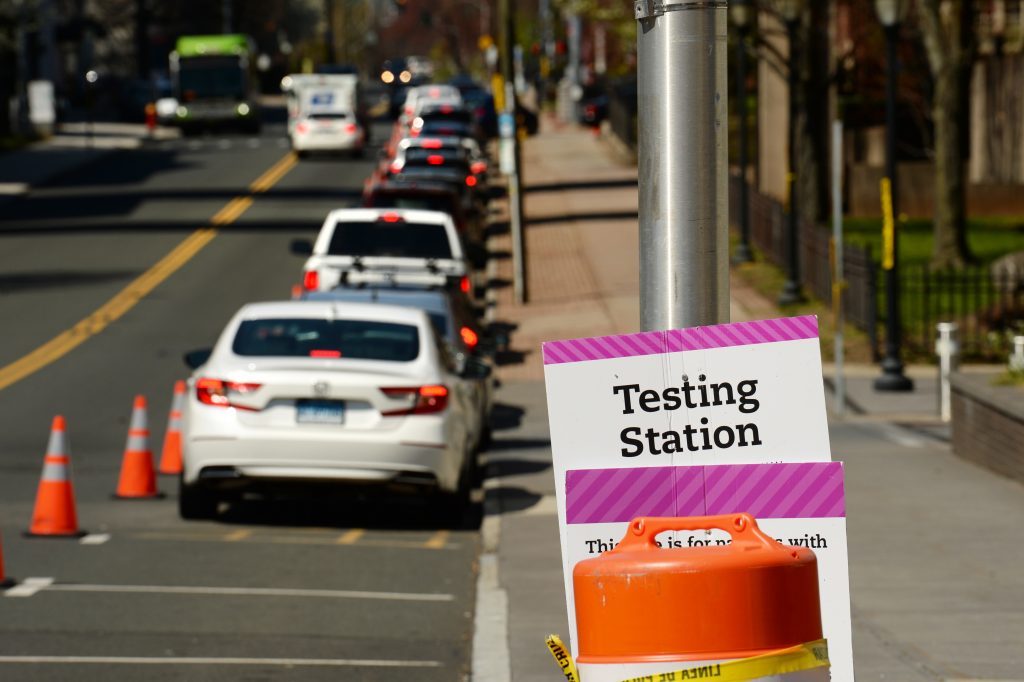
Cars queue up for Covid-19 testing at Hartford Hospital’s sampling site in Hartford Wednesday, April 15, 2020. Photo credit: Cloe Poisson, CTMirror.org
Department of Labor speeds up processing unemployment claims
The state Department of Labor employees processed approximately 60,000 requests for unemployment benefits late Wednesday and early Thursday after launching new programming to ease a filing backlog.
The department now has processed about 247,000, or two-thirds of 365,000 applications, since the pandemic began in early March, department spokeswoman Nancy Steffens said Thursday.
That’s a huge shift from mid-afternoon Wednesday when the department had processed just over half of 350,000 pending claims.
Gov. Ned Lamont and labor officials announced new programming updates this week to accelerate processing of benefit claims and also to expedite release of enhanced federal relief for the unemployed.
Prior to the changes to the labor department’s nearly 40-year-old IT system, it was taking, on average, six weeks for staff to process benefit applications. And that’s despite the agency increasing from 20 to 80 the number of workers assigned to the task.
Deputy Labor Commissioner Dante Bartolomeo said Wednesday that the administration’s goal is to reduce the average claim processing time from six weeks to one week by April 25.
Senators call for extension to DACA work authorizations
Dozens of Senate Democrats wrote to President Donald J. Trump Wednesday seeking an automatic extension of work authorizations for immigrant communities during the COVID-19 pandemic.
In the April 15 letter, Connecticut’s U.S. senators, Richard Blumenthal and Chris Murphy, joined a group of more than 30 lawmakers asking Trump to renew the authorizations – and avoid the prospect of deporting so-called Dreamers and Temporary Protected Status (TPS) recipients.
The federal Deferred Action for Childhood Arrivals program, or DACA, provides temporary deportation relief to immigrants who arrived in the United States as children. The senators said more than 200,000 DACA recipients are working in “essential” jobs, as identified by the Department of Homeland Security, during the ongoing coronavirus outbreak – including thousands of health care workers and teachers.
With stay-at-home orders in place and federal immigration offices closed to the public, the senators said immigrants facing renewals will be hard-pressed to gather the necessary documents and present them to officials already backlogged and delayed by COVID-19 disruptions.
“Your Administration can immediately ease burdens for thousands of American families, and prevent further, unnecessary economic disruptions during this public health emergency by automatically extending employment authorizations for DACA and TPS recipients and other impacted immigrants,” the senators wrote.
A Travelers Championship, but with no fans
The PGA tour announced Thursday that the Travelers Championship this year will be a TV-only event with no crowds allowed.
The Cromwell golf tournament, set to begin June 25, will be broadcast on CBS and the Golf Channel.
Despite the changes, organizers for the tournament said all of the event’s net proceeds will still go to charities, including COVID-19 relief organizations.
“Conducting the tournament without crowds on-site is in the best interest of protecting everyone, including the broader community,” said Andy Bessette, Travelers’ executive vice president and chief administrative officer, in a statement.
National Guard mobilizes to care for COVID-19 patients
Soldiers with the Connecticut National Guard and U.S. Army Reserve are now caring for COVID-19 patients at Stamford Hospital.
Military officials said Thursday that it’s part of an effort to support medical staff across the country during the coronavirus outbreak. Military medical crews have also been deployed to New York and New Jersey.
The Connecticut National Guard recently set up 200 beds at Stamford Hospital. The city has been the hardest-hit municipality in Connecticut, with nearly 1,600 of the state’s 14,755 confirmed coronavirus cases.
In other developments, the city of Stamford said it expected to begin testing all police officers and firefighters for the virus on Thursday.
CSCU summer classes moved online
Most summer classes for students at Connecticut’s 12 community colleges will only be conducted online at least through August 1, the head of the state college and university system announced this week.
The only exceptions will involve on-campus courses “for students almost ready to enter the workforce in immediately critical non-credit and credit programs,” Mark Ojakian, president of the Connecticut State Colleges and Universities, said in an email message.
Those critical types of programs all involve students who are likely to become front-line workers in the battle to deal with the coronavirus pandemic. Those critical courses include ones for nursing, medical assisting, paramedics, phlebotomy, respiratory care, radiologic technologists, advanced manufacturing and electro-mechanical, Ojakian said in the message to community college staff.
Ojakian said those hands-on courses for the critical programs could begin as early as July 20.
“All other on-ground/skill-based courses should be scheduled for the hands-on components/lab courses after August 1, including hands-on laboratory courses that were not completed in the spring,” according to Ojakian.
“If the pandemic prevents the colleges from being opened by August 1, we are exploring options for the hand-on portion to be offered in condensed sessions at the start of the fall semester,” he said.
“While I know all of us crave a return to normalcy, it is clear that the re-opening of our campuses will need to be a well thought out and deliberative process in line with the state’s recovery framework,” Ojakian said.
Greg Hladky and Keith Phaneuf contributed to this story.
This report contains information from the Associated Press.
Reprinted with permission of The Connecticut Mirror.
Like what you see here? Click here to subscribe to We-Ha’s newsletter so you’ll always be in the know about what’s happening in West Hartford! Click the blue button below to become a supporter of We-Ha.com and our efforts to continue producing quality journalism.

